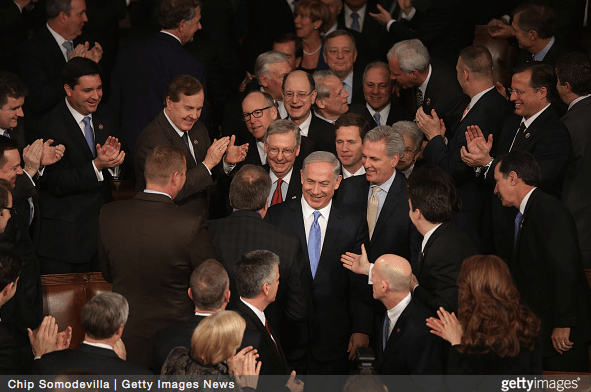Now that Israel has re-elected its hard-line Prime Minister Benjamin “Bibi” Netanyahu, the focus of America’s rancorous foreign policy debate returns to the ongoing nuclear talks with Iran about whether sanctions against it should be lifted if Tehran essentially agrees to have only a peaceful energy program instead of pursuing a bomb.
Having a nuclear armed neighbor in the region has made Israel and its supporters here in the United States very concerned about where these negotiations are headed, considering a preliminary agreement is supposed to be reached by Tuesday, March 31. That worry is echoed by members of Long Island’s Congressional delegation. They all joined a bipartisan coalition of 367 House of Representatives members in signing a letter dated March 20 that was sent to President Obama spelling out their opposition to any deal that doesn’t “completely eliminate the path to a nuclear weapon,” including an “aggressive inspection and verification regime.”
Complicating the issue earlier this month has been the role of 47 Republican U.S. Senators who, under the penmanship of freshman U.S. Sen. Tom Cotton (R-Ark.), signed a letter addressed “to the leaders of the Islamic Republic of Iran” that purported to offer the mullahs a civics lesson in how the U.S. Constitution functions, warning them that any deal would not necessarily be binding because it could be modified by Congress and entirely discarded by the next president.
Secretary of State John Kerry, a Massachusetts Democrat and former presidential candidate who has been intimately involved in the talks in Switzerland, called the letter “unprecedented,” “directly calculated to interfere” and an “unconstitutional, un-thought-out action” that caused him to react with “utter disbelief.” Vice President Joe Biden said Cotton’s letter “ignores two centuries of precedent and threatens to undermine the ability of any future American President, whether Democrat or Republican, to negotiate with other nations on behalf of the United States.”
Usually pretty sympathetic to the GOP, especially with regard to Israel, New York’s “hometown paper,” the Daily News, dubbed the 47 Republican Senate signatories “traitors” on its front page.
Seven Republican Senators didn’t sign Cotton’s correspondence. Among them was Arizona’s U.S. Sen. Jeff Flake, who told The Arizona Republic that he “just didn’t think it was appropriate.” One of the signers, though, was his fellow Arizonan, Sen. John McCain, the state’s senior senator and chairman of the U.S. Senate Armed Services Committee, who later admitted, “I think we probably should have had more discussion about it, given the blowback that there is.”
The Empire State’s Senators were both on the same page regarding their Republican colleagues’ letter. U.S. Sen. Charles Schumer (D-NY) called it “ill-advised” because it put Israel’s traditional bipartisan support in Congress at risk. Junior Democratic Sen. Kirsten Gillibrand (D-NY), who called the letter signed by the Republican Senators “unprecedented and unhelpful,” said in a statement to the Press, “It is in the national security interests of the United States and Israel for the negotiation process to result in a strong and verifiable deal that does not allow Iran to obtain a nuclear weapon. There are legitimate questions as to whether a good deal can be reached and I have communicated my concerns directly to the White House.”
Long Island’s senior Congressman, Rep. Peter King (R-Seaford), said, “I don’t think I would’ve done it if I was in the Senate.” He said he “agreed with everything” in Cotton’s letter, and he disagrees with the president. But, King added, “he is the commander in chief, and you shouldn’t have the Senate negotiating with a foreign government.”
King’s younger Republican colleague from the Island, Rep. Lee Zeldin (R-Shirley), who happens to be the only Jewish Republican Representative on Capitol Hill, said in a statement, “Substantively, I agree with the passion, tone and points made in the [Cotton] letter. A bad deal is worse than no deal at all, and unfortunately the President looks like he is willing to cut a deal just to cut a deal in order to meet arbitrary deadlines. A bad deal triggers a nuclear arms race in the Middle East. It is unacceptable for Iran to enrich uranium, maintain thousands of centrifuges, and make temporary concessions in exchange for permanent concessions on our side.”
Expressing some sympathy with the Republicans’ position was Rep. Steve Israel (D-Dix Hills). “I have always been a staunch hawk on pro-Israel issues, and I have been skeptical of a deal with Iran from the beginning,” he said in a statement. “But this game of injecting politics into the U.S.-Israel relationship is dangerous, and I refuse to take part.”
The newest member of the Island’s Congressional delegation, Rep. Kathleen Rice (D-Garden City), took a more nuanced stand than her Democratic colleague.
“I completely disagree with the Senators’ decision to send that letter to the leaders of Iran,” said Rice in a statement to the Press. “It was a serious breach of protocol, it was disrespectful not only to President Obama but to the office of the presidency, and most importantly it does nothing to help advance what should be a bipartisan effort to prevent Iran from developing a nuclear bomb.
“The letter my colleagues and I sent to President Obama,” Rice continued, “makes it clear that the vast majority of House Members – 367 Members from both parties – want to work with the President to reach a diplomatic solution that eliminates Iran’s path to a bomb. If the Iranians aren’t willing to agree to such a deal, then we’re prepared to maintain aggressive sanctions, as I’m sure the President is as well.”
Rep. Gregory Meeks (D-Queens), whose gerrymandered district includes parts of Nassau County, explained that he signed the House’s bipartisan letter to underscore “the need for the administration to consult closely with Congress as negotiations continue.” He added that in the past several days, “I have been briefed several times by the administration in a manner that reflects a commitment to keeping Congress informed.
“We all agree that no deal is better than a bad deal,” Meeks said, “and a nuclear armed Iran is in no way an acceptable option. Sanctions alone have not been enough to prevent Iran from building thousands of centrifuges.” Skeptics of the talks worry that Iran could easily use those centrifuges to refine nuclear fuel for a bomb.
Nevertheless, Meeks, like his Democratic colleagues, found fault with Cotton’s “partisan letter addressed to our adversaries in Iran with a total and stunning disregard and disrespect for our own government and the crucial and delicate nature of the diplomatic process.
“The reality is that without engaging in negotiations, we would never know what kind of deal is possible,” Meeks said. “Attempting to weaken the hand of our negotiators is working in direct and diametrical opposition to American security interests.”
Meanwhile in Tehran, Iran’s leadership cursorily dismissed the Republican Senators’ letter as a “propaganda” stunt designed for domestic consumption and vowed to press forward with the talks in Switzerland. “No one in Iran is against the resolution of the nuclear issue through negotiations,” said Ayatollah Ali Khamenei reportedly in a speech last Saturday commemorating Iran’s New Year’s Day. “What the Iranian nation does not want to agree with is the impositions and bullying of the Americans.”

































